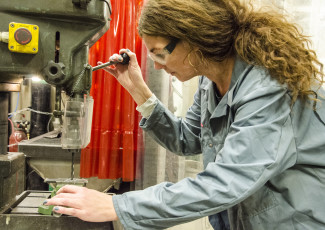Partnership Creates Pathways to Success
By Sarah Asp Olson
May 18, 2016
The partnership behind the Southwest Minnesota Career Pathways Program is meeting the need for skilled labor in Southwest Minnesota.
The Southwest Minnesota Career Pathways Program (CPP) has a success rate that program partners can be proud of: About 85 percent of participants complete training in high-demand fields such as health care and manufacturing and get hired immediately; approximately 16 percent complete the program and continue their education.
CPP partners are Minnesota West Community and Technical College; the Southwest Minnesota Private Industry Council (PIC), a nonprofit workforce development agency; and Southwest Adult Basic Education (ABE). Launched in 2003, the grant-funded special project initially targeted unemployed or underemployed English-language learners.
Over the past 12 years, the program and the partnership have grown to meet the needs of Southwest Minnesota’s residents and workforce. CPP continues to train underskilled adults in high-demand industries and has added training and licensure in areas such as carpentry and construction trades, commercial driving and community interpretation.
CPP has raised more than $1.5 million in grants so far over the life of the program, allowing participants to attend tuition-free. Last year, the Minnesota Department of Employment and Economic Development awarded CPP a $350,000 Pathways to Prosperity grant.
“We are very passionate about making a positive impact for individuals here in our region,” says Dawn Regnier, director of customized training and continuing education at Minnesota West. “That impact on them as individuals has had a positive impact on their families and ultimately resulted in a stronger workforce for our employers.”
The power in partnership
The resources each CPP partner brings to the table are key to the program’s success.
“The strength of what we do here … is collaboration and understanding what each agency’s strengths are and then utilizing that to navigate for the success of the student,” says Roxanne Hayenga, community development coordinator at Minnesota West. “The partnership piece of it allows each of us to do what we do best so we’re not duplicating services.”
Minnesota West offers technical skills programs, credentialing and industry-recognized training. ABE provides support services to CPP students, such as contextualized basic skills instruction, and assists with literacy and comprehension skills development. “It’s a team-teaching approach, with integrated instruction to reinforce the technical skills and offer instructional support in the classroom,” Regnier says.
ABE instructors also serve as mentors and tutors for learners who may lack basic classroom or job-readiness skills. “Some of these students who wouldn’t necessarily have success in a college classroom are really able to be successful,” Hayenga says.
Southwest Minnesota PIC serves as a central point of contact for CPP students and offers help with employment, including career counseling, resume preparation and job search and placement assistance.
“In addition to the three agencies that are responsible for preparing and delivering the training, our fourth partner is our employers,” Regnier says. CPP regularly meets with regional employers and invites them to participate in everything from developing training programs to meeting with students.
“[At CPP], everybody knows what Minnesota West can deliver, everybody knows what [PIC] can deliver, and we all understand how ABE and our employers partner with that,” Regnier says. “We continually draw on the resources we have within our agencies and build those relationships.”







